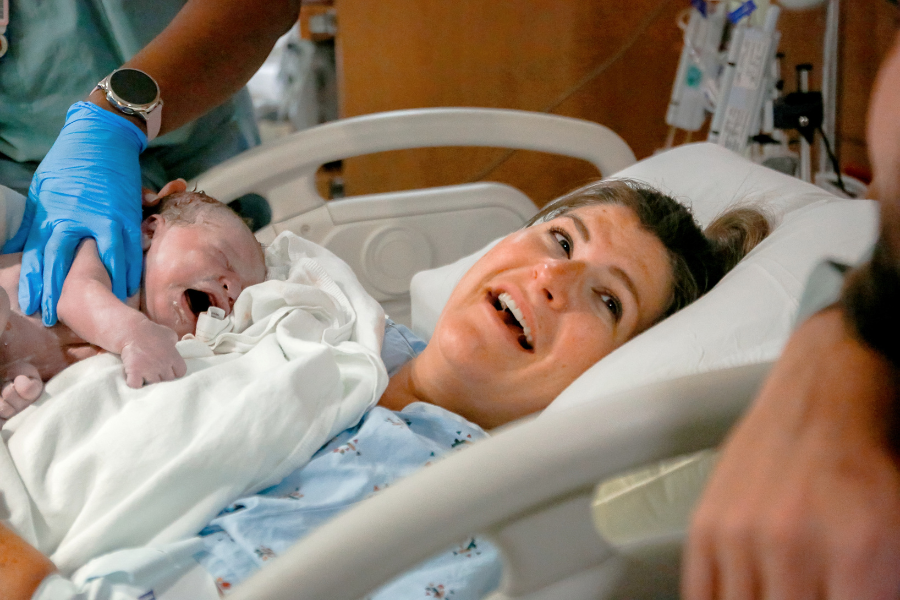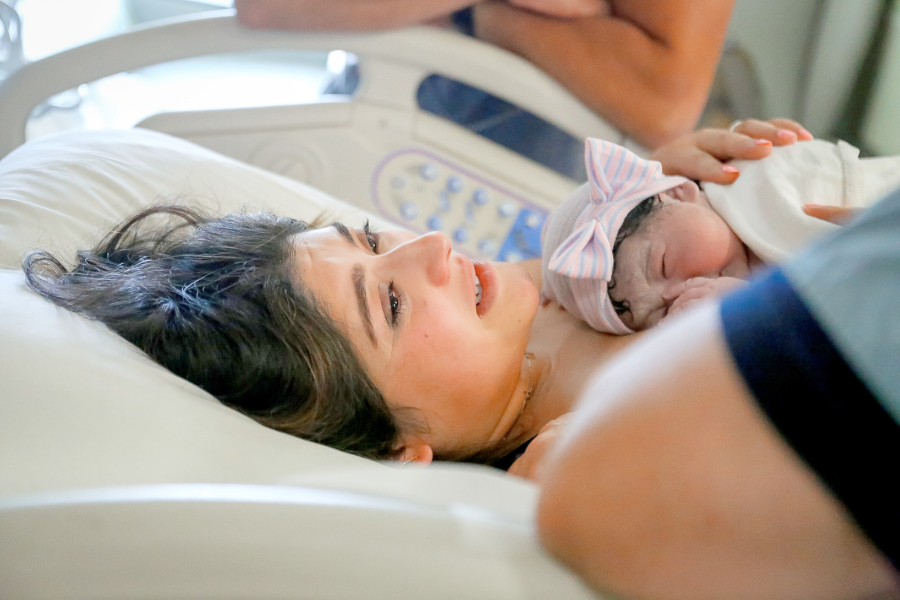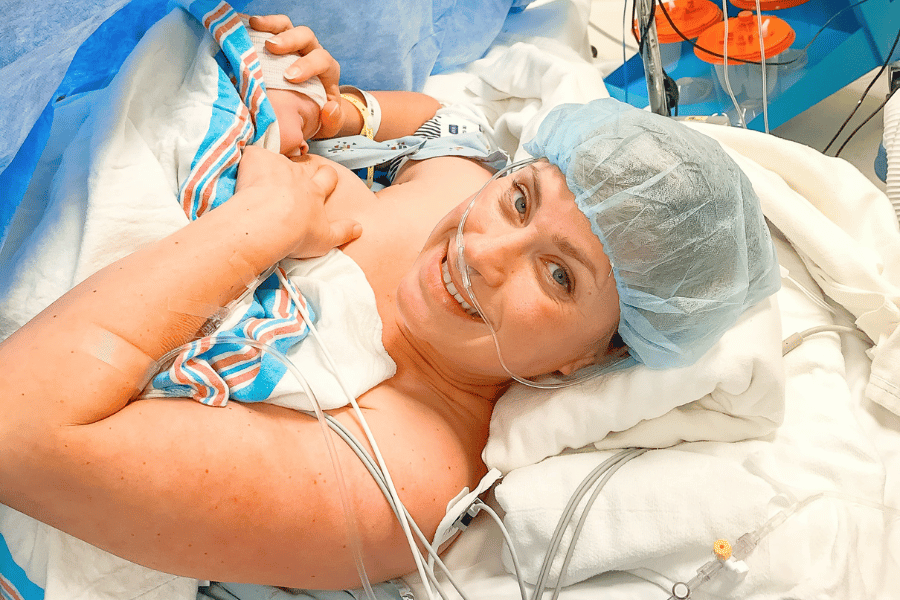Hi Mama! If you’re pregnant (or planning to become pregnant soon), you may be beginning your search for a health care provider – great idea! Through your search, you may be wondering the question, “What is a Midwife?“.
Let’s first go over the different types of midwives. Then we’ll look in detail at midwife vs. OBGYN. Ready, mama? Let’s go!
Follow @mommy.labornurse on Instagram to join our community of over 650k for education, tips, and solidarity on all things pregnancy, birth, and postpartum!
What is a midwife?
A midwife is a trained health professional. She works with women to provide healthcare and support during:
- Pregnancy
- Labor and delivery
- The postpartum period (including breastfeeding support and newborn care!)
They may also provide family planning, preconception, and gynecological care to women throughout their lives.
Midwives Model of Care
- Monitoring the physical, psychological, and social well-being of the mother throughout the childbearing cycle
- Providing the mother with individualized education, counseling, and prenatal care, continuous hands-on assistance during labor and delivery, and postpartum support
- Minimizing technological interventions
- Identifying and referring women who require obstetrical attention
What are the benefits of using a midwife?
According to the American College of Nurse-Midwives, benefits of receiving midwifery care include:
- Decreased risk of needing a Cesarean section
- Reduced rates of labor induction and augmentation
- Reduced use of regional anesthesia
- Decreased infant mortality rates
- Lower risk of preterm birth
- Decreased third and fourth-degree perineal tears
- Lower costs for both clients and insurers
- Increased chances of having a positive start to breastfeeding
- Increased satisfaction with the quality of care
Different Types of Midwives (and why it matters!)
Did you know, in the United States there are actually a few different types of midwives? In other countries, typically there is only ONE way to go about getting your midwifery license and ONE set of standards – in the United States there are a few different ways.
It’s important to recognize this when choosing a midwife because it’s very important for you as a patient to understand how your midwife is licensed (or not licensed). This will help you in selecting the best care possible FOR YOU during your pregnancy!
Certified nurse-midwives (CNMs)
- A registered nurse who receives additional training in pregnancy and childbirth
- Offers complete prenatal care, as well as attending births
- Has a bachelor’s in nursing (BSN) degree from an accredited institution
- Has a master’s degree in nurse-midwifery
- Certified by the American College of Nurse-Midwives (ACNM)
- Eligible to become licensed in all 50 states
- Can practice in hospitals and OB offices, but their scope also allows them to provide care in any birth setting
- Cannot perform Cesarean deliveries, and in most cases do not perform vacuum or forceps deliveries
- Generally care for low-risk pregnancies
- Most deliver in hospitals and are affiliated with a physician
Certified midwives (CMs)
- An individual certified and trained in midwifery
- Offers complete prenatal care, as well as attending births
- Has a bachelor’s degree from an accredited institution. The bachelor’s degree is not in nursing
- Has a master’s degree in nurse-midwifery
- Certified by the American College of Nurse-Midwives (ACNM)
- Relatively new specialty. Currently only Delaware, Hawaii, Maine, Maryland, New Jersey, New York, Oklahoma, Rhode Island, Virginia, and the District of Columbia license CMs
- Can practice in hospitals and OB offices, but their scope also allows them to provide care in any birth setting
- Cannot perform Cesarean deliveries, and in most cases do not perform vacuum or forceps deliveries.
- Generally care for low-risk pregnancies
- Most deliver in hospitals and are affiliated with a physician
Certified professional midwives (CPMs)
- Provide complete prenatal care and attends births
- Works independently, usually delivering women at home or in freestanding birth centers
- Do not have to hold a specific degree or be a registered nurse. A high school diploma is the minimum requirement
- Experience may be gained through formal programs, apprenticeships, or a combination of both
- Is the only midwifery credential that requires knowledge about and experience in out-of-hospital settings
- Must pass a competency test by the North American Registry of Midwives (NARM)
- Licensed or otherwise regulated in 31 states
Direct entry midwives (DEMs)
- Provides complete prenatal care
- Specializes in births at home and in freestanding birth centers
- Practices independently and has learned midwifery through a midwifery school, apprenticeship, or college program in midwifery
- No national licensing or certification is available. Each state has its own legal requirements for education and licensing (if any)
Traditional/Lay/Empirical/Community-based midwives
- Not certified or licensed as a midwife but has received informal training through self-study or apprenticeship
- Training is not regulated, therefore abilities may vary
- Generally do not deliver babies in a hospital, but instead attend home births and may practice in a birth center
Midwife vs. OBGYN
Midwives are trained to care for healthy, low-risk women during pregnancy and childbirth. Many work closely with obstetricians and will refer out high-risk pregnancies.
If you have a high-risk pregnancy or anticipate complications, it is recommended to choose a practice that has access to obstetricians, perinatologists, and other professionals who are trained to address these complications.
What is an obstetrician (OBGYN)?
An obstetrician is a medical doctor who specializes in the management of pregnancy, labor, and birth. They have specialized education in surgical care, focusing on the detection and management of the female reproductive system if obstetrical or gynecological problems occur.
OBGYNs are required to attend and graduate from medical school, and then complete an additional four years of residency training in obstetrics, gynecology, gynecology oncology, ultrasonography, and preventative care.
What are the benefits to choosing an OBGYN?
According to the American Pregnancy Association, benefits to choosing an OBGYN include:
- Specialized training to manage high-risk complications such as preeclampsia or placenta previa
- Specialized surgical training if a C-section is needed
- You may also just be more comfortable with your current OBGYN caring for you (this is a common reason why women choose the group they are in)!
Which is better – Midwife vs. OBGYN?
You may think a midwife is a “better choice” but that’s not necessarily true!
There are fabulous OBGYNs and midwives out there, and there are also horrible OBGYNs and midwives out there.
If you’re searching for a care provider, I encourage you to find a provider who aligns with what YOUR definition of birth feels like, and one who treats you with respect and listens to your concerns!
Resources
- Midwives Alliance of North America
- American College of Nurse-Midwives
- American Pregnancy Association
- Midwifery laws state-to-state
- State law chart for CPMs
- Find a CNM or CM





